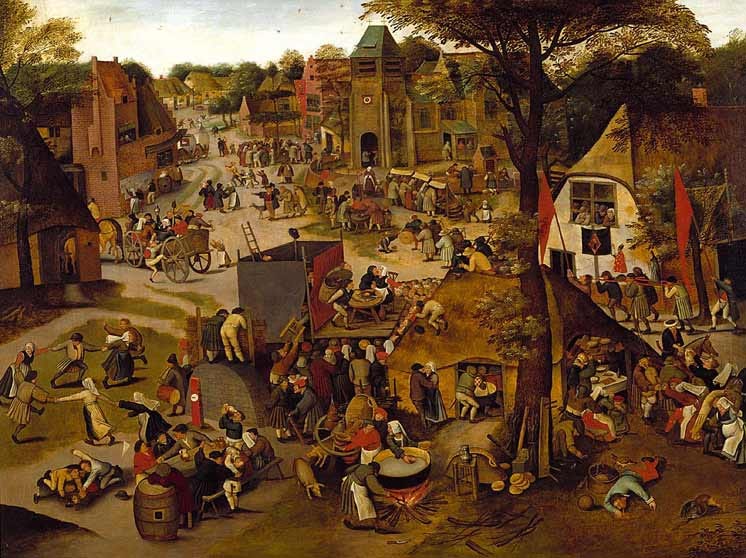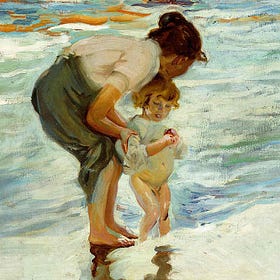"it takes a village to raise a child"
interdependence, community, and loneliness in early motherhood
I had hoped to write a piece exploring my ambivalence and thoughts around returning to a paid job, but it’s spiralled into something longer and bigger than I can finish this week, so I’ve polished up this draft from my notes instead. I hope you enjoy!
A common refrain amongst modern mothers is that "it takes a village to raise a child but I don't have a village". They are lamenting the lack of support for new parents, specifically new mothers, that can make the early days and years of motherhood a hard and lonely road. I don't disagree with the sentiment of this refrain, but I do think it's not the whole truth.
It's true that mothers, especially first time mothers, need support and community, and that both of these are sorely lacking in our modern, individualistic culture. So many of us live fractured, atomised lives, with few of the support networks of extended family, church, and wider community that our forbears could call on for assistance. Mothers who choose to stay home with their children often face an especially lonely existence, as most of their peers return to work, there are less and less fellow mothers available to befriend and organize play dates with, and you are left feeling like you’ve been left behind whilst the whole world carries on around you. Being at home, alone, with small children is a unique kind of challenging, and can feel incredibly isolating. I’ve written about my experience of early motherhood, and how transformative I found process of becoming a mother, here.
Birth of a mother
When I was pregnant with my first child, I spent a lot of time thinking about and preparing to give birth, but not much time thinking about becoming a mother. If I tried to think about what my life would be like after the baby was born, I struggled to picture it. It was hazy and unclear, the details shifting and …
So, I’ve thought quite a lot about the idea of ‘the village’, and it’s lack in modern Western culture. For me, having a village is about so much more than having someone to do things for you. So much of what I long for in a village is to be held in community, to not be alone. When I first became a mother, we didn’t have any family close by. I couldn’t just pop over and see either my mother or my mother in law without preplanning a visit. I didn’t fully realise it at the time, but I was desperately lonely during the early months as a first time mother. I was struggling with undiagnosed PPA, which I suspect was at least partially caused by a birth that I found traumatic and somewhat violating (it was in the hospitals eyes entirely routine and in fact "successful", which made me feel even more confused). I used to call my mum and beg her to come and visit. Which to her eternal credit she frequently did, driving across the UK with her dog in tow. It wasn’t primarily help with the housework that I craved, although she did help cook and it was nice to have someone else to rock the baby sometimes. I mostly just didn't want to be alone. Having someone there helped lift the burdens and anxieties I felt as a new and inexperienced mother.
I remember those early postpartum days as a desperately lonely time. I was so afraid of everything, plagued by intrusive thoughts that made me question my sanity. Afraid I would drop my baby, afraid I would suffocate her by falling asleep whilst breastfeeding, afraid I would put her down for a nap and that she wouldn’t wake up. But most of all, I was afraid of being alone with my fears. So I called my mum. When I felt like I was drowning in my own head, she was the lifeline I clung to. She would walk through my door and I would instantly feel more relaxed and capable. Then the days would pass, oh so quickly, and it would be time for her to leave again. I distinctly remember watching her walk out my front door and immediately chocking back tears, as my loneliness and fear came rushing back. Her presence could hold it at bay but the shadows still lurked, waiting to overwhelm me.
The nights were a source of terror to me. I would feel physical dread as the evening approached, knowing that I faced another night of broken sleep and angry screams from my tiny infant, who I felt powerless to help.
So, when women talk about their loneliness and desire for support, I get it, I truly do.
Keep reading with a 7-day free trial
Subscribe to The Wisdom of Women to keep reading this post and get 7 days of free access to the full post archives.





